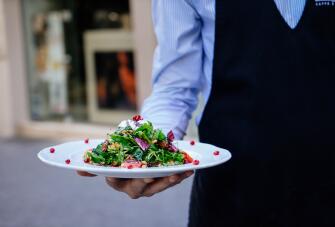Restaurant SEO - Optimizing Your Restaurant Online Presence
Welcome to our blog, where we're serving up a plateful of valuable insights into the world of restaurant SEO. In today's digital era, having a delectable menu and a cosy ambience are not the only ingredients required for success in the culinary industry. To stand out from the crowd, you need to master the art of optimising your online presence by creating an SEO strategy.
In this blog post, we'll take you on a flavoursome journey through the realm of restaurant SEO, exploring how it can enhance your visibility and attract more hungry patrons to your restaurant business. We'll equip you with a range of essential tips and techniques to maximise your restaurant website, drawing upon the most effective strategies in the industry.
Here's a taste of what we'll be covering in this blog post:
- Importance of restaurant SEO
- Create your own SEO strategy
- Learn about menu optimisation
- Implement a mobile-friendly approach to your strategy
- Technical SEO for restaurants
What is restaurant SEO and why it matters
Picture this: You're in a new city, stomach growling, and craving a memorable dining experience. What's the first thing you do? Whip out your smartphone and search for the best restaurants nearby, right? Well, my hungry friend, that's where restaurant SEO comes into play.
So, what exactly is restaurant SEO? It's like the secret sauce that makes your restaurant more visible and appetising digitally. SEO stands for Search Engine Optimisation, and it's all about optimising your restaurant's online presence to rank higher in search engine results. In other words, it's the art of getting your website in front of the right eyes (and stomachs!).
But why is restaurant SEO so important in today's industry? Let me break it down for you:
Hungry diners are searching online
Gone are the days when people flipped through bulky phone books or relied solely on word-of-mouth recommendations to find a great place to eat. Nowadays, hungry diners turn to search engines such as Google and Bing and other search engines to satisfy their cravings.
By investing in SEO efforts, you're putting your restaurant right where people are looking – in the top search results.
Beating the local competition
The restaurant industry is highly competitive, especially where there are likely dozens (if not hundreds) of restaurants vying for attention. With effective SEO strategies and a strong online presence, you can rise above the noise and stand out from the competition. By optimising your website, content, and online presence, you increase your chances of attracting more customers and generating more business.
Targeted website traffic that converts
Imagine that you own a cosy Italian restaurant known for its mouthwatering pasta dishes. Now, wouldn't it be fantastic if your website showed up at the top of the Google search results when someone in your city typed in "authentic Italian pasta"?
By targeting specific keywords and optimising your mobile responsive website, and ranking pages accordingly, you can drive highly targeted traffic to your virtual doorstep – people who are actively seeking what your restaurant offers. And when the right people find you, they're more likely to convert into loyal customers.
Building trust and credibility
Appearing at the top of search engine results doesn't just bring in hungry diners; it also builds trust and credibility. People often associate higher search rankings with authority and quality.
So, when your restaurant name consistently appears in search results, potential customers perceive you as a reputable establishment worth trying. With a well-executed SEO strategy, you can establish your restaurant as a go-to destination in the minds of your target audience.
Long-term benefits and cost-effectiveness
Investing in restaurant SEO isn't just a one-time deal. The efforts you put into optimising your online presence can have long-term benefits. Unlike traditional advertising methods that require ongoing expenses, SEO can deliver sustainable results that continue to attract customers over time.
Plus, compared to other marketing strategies, SEO can be cost-effective, especially when you consider the return on investment it offers in terms of increased online visibility and business growth.
In today's restaurant industry, where online searches reign supreme, restaurant SEO is like the secret ingredient that takes your establishment from a hidden gem to a must-visit destination. By embracing SEO techniques, you can ensure that hungry diners find their way to your tables, indulge in your culinary delights, and keep coming back for seconds. So, get ready to optimise, rank, and savour the sweet taste of success!
Restaurant POS System
Evolve your hospitality business using the power of POS system technology.
Create your restaurant SEO strategy
Alright, fellow restaurateurs, it's time to whip out our SEO chef hats and start cooking up a delectable SEO strategy. Just like crafting a delicious recipe, creating an effective SEO strategy for your restaurant requires careful planning and a dash of creativity. Let's get started with these simple steps:
Set your restaurant goals
Before diving into the world of SEO, it's essential to define what you want to achieve. Are you aiming to increase online ordering, drive more foot traffic, or boost your brand awareness? Understanding your goals will shape the rest of your SEO strategy and help you measure your success.
Top tip: Check how building a restaurant business plan can guide you when shaping this type of digital marketing strategy accordingly to your business goals.
Know your target audience
To attract the right customers, you need to understand who they are and what they're searching for. Take some time to identify your target audience, their preferences, and their online behaviour.
Are they food enthusiasts seeking culinary adventures, or families looking for a kid-friendly dining experience? By gaining insights into your audience, you can tailor your SEO efforts to resonate with their needs and desires.
Keyword Research
Keywords are the seasoning that flavours your SEO strategy. Conduct thorough keyword research to discover the terms and phrases your target audience is using when searching for restaurants like yours.
Focus on relevant keywords that align with your cuisine, restaurant's location, and unique selling points. You can use keyword research tools like Google Keyword Planner or Moz's Keyword Explorer as your sous chefs in this process.
On-page SEO optimisation
Just like plating a dish to make it visually appealing, on-page optimisation ensures your restaurant website is search engine-friendly and easily digestible for both search engine crawlers and human visitors.
So, optimise your website's meta titles, meta descriptions, headings, and content by incorporating your chosen keywords naturally. Ensure the meta description of your website is user-friendly, loads quickly, and has a responsive design that adapts to different devices.
Top tip: Read more on the key elements of a restaurant's website to achieve SEO success.
Local restaurant SEO
For restaurants, local SEO is a game-changer. Make sure your restaurant is visible to hungry locals by optimising your Google My Business profile with accurate information, including your address, phone number, hours of operation, and photos. By doing this, your restaurant will have a higher probability to rank for 'restaurants near me'
Top tip: If you haven't listed your business information on search engines yet, learn now how to get your business on Google!
Also, encourage customers to leave reviews on platforms like Google, Yelp, or TripAdvisor to boost your local search results. And don't forget to include location-specific keywords throughout your website to enhance Google search results for local businesses.
Top tip: Read more on how to get Google reviews to build that trust between your restaurant and your customer base.
Create meaningful content
Serve up some tasty content that showcases your restaurant's unique personality, culinary expertise, and engaging stories.
You could start a blog on your website and create content that provides value to your audience, such as recipes, behind-the-scenes peeks, or interviews with your chef. Use your keywords strategically within your content and aim for high-quality, shareable material that can attract backlinks and boost your SEO rankings.
Link building for your restaurant
Think of link building as the icing on the cake of your SEO strategy. By obtaining high-quality backlinks from reputable websites, you can improve your restaurant's authority and visibility in search results.
Reach out to local food bloggers and review sites, collaborate with influencers on social media channels, or participate in community events to secure those valuable links. Additionally, showcase your expertise by guest posting on relevant industry websites, further establishing your restaurant as a go-to resource.
Measure your seo performance and adapt
No recipe is complete without a taste test, and your SEO strategy is no exception. Monitor your website's performance using tools like Google Analytics and Google Search Console. Keep an eye on key metrics such as organic traffic, rankings, and conversion rates.
Adjust your marketing strategy, as needed based on the data, and continuously optimise and refine your SEO efforts to achieve the best results.
Menu optimisation as part of key restaurant seo tips
Your menu is the mouthwatering centrepiece of your restaurant's culinary delights, and it deserves to shine not only on the tables but also in the digital marketing realm. In this section, we'll guide you through some effective strategies to optimise your menu and make it a feast for both search engines and potential diners.
Transcribe your menu into text format
Search engines are hungry for text on web pages, not images or PDFs. To make your menu SEO-friendly, it's crucial to transcribe it into text format on your website.
By doing so, search engines can crawl and index your menu, making it easier for them to understand and rank your offerings. Ensure that your menu items, descriptions, and prices are all clearly presented as text on your website.
Optimise menu titles and descriptions
Just like a tantalising dish needs a flavorful name, your menu items should have descriptive and keyword-rich titles.
Instead of simply listing "Chicken Parmesan," consider adding some flair with "Succulent Grilled Chicken Parmesan Delight." Make sure to incorporate relevant keywords throughout your menu descriptions while keeping them enticing and appetising.
For example, instead of "Grilled Salmon," try "Tender Grilled Salmon Fillet infused with a zesty lemon herb glaze."
The implementation of images in restaurant websites
A picture is worth a thousand words, and in the case of your menu, it can make mouths water. Include high-quality, professionally captured images of your signature dishes on your restaurant website.
A juicy steak sizzling on the grill or a beautifully plated pasta dish can entice visitors to order before they even step foot in your restaurant. Optimise the image file names and alt tags with relevant keywords to further enhance their SEO impact and allow search engines to recognise your restaurant easier.
Highlight specials and unique offerings on your restaurant website's menu
If your restaurant offers daily specials, seasonal dishes, or unique culinary creations, be sure to feature them prominently on your menu.
You can highlight these specials with eye-catching banners, separate sections, or icons. This not only adds visual appeal but also increases the chances of these items appearing in search results when potential diners are specifically seeking them out.
Top tip: With our restaurant POS system marketing integrations, you can send personalised email campaigns to customers or reward them by creating loyalty programs through apps like Loyalzoo to keep attracting more traffic to your restaurant's location.
Consider menu structuring and navigation
Make it easy for visitors to navigate through your menu and find what they're looking for. Organise your menu into clear sections, such as appetisers, entrees, desserts, or vegetarian options.
Top tip: Include a search function or filtering options if you have an extensive menu.
A well-structured and user-friendly menu not only improves the overall user experience but also makes it easier for search engines to understand and index your content.
Keep your restaurant menu up-to-date:
Regularly update your online menu to reflect any changes, seasonal specials, or new additions. There's nothing more disappointing for diners than discovering that their desired dish is no longer available. By keeping your menu fresh and accurate, you'll maintain the trust and interest of your potential customers.
Top tip: Discover how simplifying inventory management with our restaurant POS system could help to avoid shortages thanks to real-time automated reporting skills.
By optimising your menu for search engines and tantalising potential diners with enticing descriptions and mouthwatering images, you'll create an irresistible restaurant online dining experience. So, get ready to tickle taste buds and entice customers with your SEO-friendly menu that leaves them craving for more.
Implement mobile-friendly SEO for restaurants
In today's fast-paced world, it's no secret that mobile devices have become an integral part of our lives. From checking emails to scrolling through social media feeds, people are constantly connected on their smartphones.
That's why it's essential for your SEO strategy to be mobile-friendly, ensuring your restaurant is serving up success to customers on the go. Let's dig into why mobile-friendliness is a must-have ingredient for the technical SEO side of your strategy.
Mobile-first indexing
Search engines, such as Google, have recognised the shift towards mobile usage and have adjusted their algorithms accordingly. Google now predominantly uses mobile-first indexing, which means it primarily crawls and indexes the mobile version of websites [1].
By embracing mobile optimisation, you're signalling to search engines that your website is relevant, user-friendly, and deserving of higher visibility which will impact positively your rankings.
Mobile searches are on the rise!
Picture this: A hungry customer is strolling through town, searching for a place to satisfy their cravings. What do they do? They pull out their trusty smartphone and fire up a search engine.
After Google went all 'mobile-first' in 2020, 55% of online searches are now conducted on mobile devices [2]. So again, if your website isn't optimised for a mobile device, you risk missing out on a significant portion of potential diners who are actively seeking a place to dine.
Enhanced user experience for restaurant websites
When it comes to mobile browsing, user experience is key. Have you ever visited a website on your phone only to find it difficult to navigate, with tiny text, and buttons that are impossible to tap accurately? Frustrating, right?
By ensuring your website is mobile-friendly, you provide a seamless and enjoyable browsing experience for your visitors. Mobile optimisation means larger, easy-to-read text, responsive design that adapts to different screen sizes, and intuitive navigation. So, make sure your website design and layout tick all the following boxes:
- Compress any images
- Minify CSS and JavaScript files
- Leverage caching techniques
These will help your restaurant business to be optimised for speed which is another ranking factor for Google search results. You can monitor your website's performance using tools like Google PageSpeed Insights to make the necessary changes to optimise your online presence.
Meanwhile, a positive user experience not only keeps visitors engaged but also increases the likelihood of them making a reservation or visiting your restaurant.
Top tip: Explore how you could create or upgrade your existing website's efficiency with Epos Now's website builder!
Local mobile searches
When it comes to local mobile searches, optimising your restaurant's online presence is key, and Google Maps plays a vital role. As we mentioned earlier, local SEO is crucial, especially in the context of mobile searches. Nowadays, people frequently search for nearby dining options while they're on the move.
With mobile-friendly SEO and a well-optimised presence on Google Maps, your restaurant can shine brightly when hungry users search for phrases like "restaurants near me" or "best Italian food in [your city]." By ensuring your restaurant appears prominently in these local search results, you increase the chances of attracting those on-the-go diners and satisfying their cravings.
Competitive advantage for your restaurant website
Not all restaurants have embraced mobile optimisation yet, which presents a golden opportunity for you to gain a competitive edge.
By prioritising mobile-friendly SEO, you stand out from the crowd and provide a superior online experience. When potential customers compare your mobile-friendly website to a competitor's clunky, non-responsive one, guess who'll come out on top? By catering to the mobile-savvy audience, you position your restaurant as modern, accessible, and in tune with the evolving digital landscape.
Other technical SEO areas you should keep an eye on for a successful SEO strategy
When it comes to restaurant SEO, it's not just about serving up delicious content and optimising keywords. The technical aspects of your online presence play a crucial role in determining your search engine rankings and overall visibility.
In this section, we'll explore the other key ingredients of technical SEO for your restaurant, ensuring that your website runs smoothly, search engines can crawl and index your content effectively, and your online presence is optimised to its fullest potential.
Proper website structure
A well-organised and logical website structure not only helps users navigate your site but also aids search engines in understanding your content. Use clear and descriptive URLs, create a hierarchical structure with categories and subcategories, and ensure that your internal linking is well-structured. By organising your website effectively, you make it easier for search engines to crawl and index your content, enhancing your chances of ranking higher in search results.
Schema markup
Schema markup, also known as structured data, provides additional context and information about your restaurant to search engines.
By implementing schema markup on your website, you can enhance your search engine listings with rich snippets, including details like star ratings, opening hours, reviews, and menu items. This not only makes your listing more informative but also improves visibility and click-through rates, as users are more likely to click on results with additional relevant information.
XML sitemap
An XML sitemap is like a map that guides search engine crawlers through your website, ensuring that all your pages are discovered and indexed. Generate and submit an XML sitemap to search engines, which lists all the important pages on your website, including menu pages, location information, and blog posts.
Regularly update your sitemap to reflect any changes or additions to your website's content.
SSL certificate
Securing your website with an SSL certificate is essential for both user trust and SEO. It encrypts data transmitted between your website and users, ensuring that sensitive information remains private and protected.
Search engines prioritise secure websites and may give a slight ranking boost to those with an SSL certificate. Displaying the padlock symbol in the browser address bar reassures visitors that their information is secure, increasing their confidence in your restaurant.
Website accessibility
Accessibility is not only important for users with disabilities but also for search engines. Ensure that your website adheres to web accessibility guidelines, making it usable for everyone.
Provide alternative text for images, use clear and descriptive headings, and ensure proper colour contrast for readability. Making your website accessible not only expands your potential audience but also signals to search engines that you're committed to providing a positive user experience.
Final thoughts on restaurant SEO tips
In conclusion, implementing effective restaurant SEO strategies, including mobile-friendliness and leveraging platforms like Google Maps, can make a significant difference in the success of your restaurant in today's digital landscape.
By optimising your website, menu, and online presence, you can improve your visibility, attract more customers, and enhance their overall experience. Also, in terms of technical SEO, by ensuring your website is fast, mobile-responsive, and well-structured, you create a solid foundation for search engines to crawl and index your content effectively.
So, get ready to sizzle in the world of restaurant SEO and watch your business flourish. Happy optimising!
Get in touch with us today to learn more about our restaurant POS systems and how we can help you take your business to the next level.



